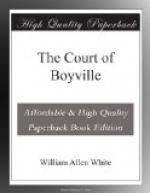For does not the first article of the law of this Free Town expressly state, that boys shall be absolved from obeying any and all laws regulating the human stomach, and be free of the penalties thereto attaching? And again when Wisdom says that the boy shall give up his superstitions, the boy points to hoary tradition, which says that the snakes tail does not in fact and in truth die till sundown; that if a boy kills a lucky bug he shall find a nickel; that to cross one’s heart and lie, brings on swift and horrible retribution; that letting the old cat die causes death in the family; that to kill a toad makes the cow give bloody milk; that horsehairs in water turn to snakes in nine days; that spitting on the bait pleases the fish, and that to draw a circle in the dust around a marble charms it against being hit. What tradition, ancient and honorable in Boyville, declares is true, that is the Law everlasting, and no wise mans word shall change the law one jot nor one tittle. For in the beginning it was written, to get in the night wood, to eat with a fork at table, to wear shoes on Sunday, to say “sir” to company, and “thank you” to the lady, to go to bed at nine to remember that there are others who like gravy, to stay out of the water in dog days, to come right straight home from school, to shinny on your own side, and to clean those feet for Heaven’s sake,—that is the whole duty of boys. As it was in the beginning, so it shall be ever after.
Now most of us grown-ups do not admit these things, and not being able to speak the language of the people whose rights we are seeking to destroy, we will never know how utterly futile are our conspiracies. But that is immaterial.
The main point that the gentle reader should bear in mind is this: The town of Boyville is free and independent; governed only by the ancient laws, made by the boys of the elder days—by the boys who found bottom in the rivers that flowed out of Eden; by little Seth, little Enoch, little Methuselah, and little Noah; by the boys who threw mud balls from willow withes broken from trees whereon David hung his harp a thousand years thereafter. For Boyville was old when Nineveh was a frontier post.
Boyville hears from afar the buzz about principalities and powers, the clatter of javelins and the clash of arms, the hubbub of the “Pride and pomp and circumstance of glorious war.” The courtiers of Boyville cheer for each new hero, and claim fellowship with all “like gentlemen unafraid.” But the Free Town has its own sovereign, makes its own idols. And the clatter and clash and hubbub that attend the triumphs of the kingdoms of the earth pass by unconquered Boyville as the shadow of a dream.
THE MARTYRDOM OF “MEALY” JONES
A WAIL IN B MINOR
Oh, what has become of the ornery boy,
Who used to chew slip’ry
elm, “rosum” and wheat:
And say “jest a coddin’”
and “what d’ye soy;”
And wear rolled-up trousers
all out at the seat?




